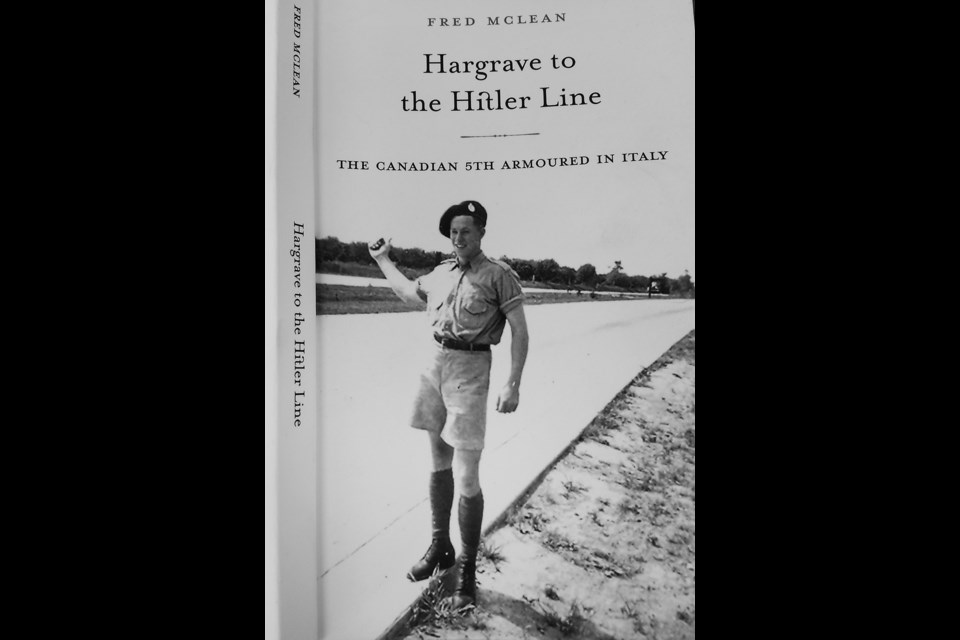Elkhorn author Fred McLean has nailed what Canadian ‘boys’ faced going into WW II, as seen through the eyes of his Uncle Bud from Hargrave, Manitoba.
The evening of Mar. 11, Hargrave Hall (former two-room school) proved to be a fitting venue for McLean’s book launch, Hargrave to the Hitler Line.
The scene was set - with Elkhorn war historian Ed James’ display of WW II Canadian military uniforms, guns, and memorabilia – in the old hall, a former two-room schoolhouse, just a couple of kilometres from the farm home of Bud McLean and Ab Bickerton, the book’s protagonists.
“To be back there in that school where all those boys went to school, with our own little boy running up and down the ramp and playing in the snow, we came full circle,” says Fred McLean.
The little hall was filled with friends, neighbours and family members (immediate and arm’s length), as McLean said, “Thanks for showing up in this incredible venue. I’ve never been here before. My uncles and the people between these pages have all been here, sat at little desks and dreamed about what their future was.
Young western Manitoba soldiers joined the Fifth Canadian Armoured Division; the story takes place during the Italian Campaign of 1944 – in Liri Valley, with the battle for the Melfa Crossing, pressing on to Rome against Hitler’s troops.
“You’ll find it’s written in screenplay format. I like reading scripts, I like the science of them, I like the way they spark the visual imagination somewhat quicker than you would get in a standard novel,” said McLean before he began to read:
FADE IN:
EXTERIOR LIRI VALLEY – ITALY – PREDAWN SUPER IMPOSED – May 24, 1944
A clear night sky, dotted with stars. Then, a trio of distant CRACKS are heard as three shells from German 88s are launched. The missiles invade the placid air space above, growing ever closer and louder until they sound like oncoming freight trains.
Voices in the darkness:
MACY
Get down! Get your heads down boys!
Two of the shells EXPLODE in a series of orange flashes about 200 yards away....
Both funny and spine tingling, McLean’s animated presentation held the audience – seniors to youth – in rapt attention.
The action heats up for Bud McLean at the Melfa Crossing:
Thirteen men hung precariously to a tiny bridgehead, waiting to be reinforced.
Out-manned, and out-gunned, their commander radioed the recce troop and gave them permission to retreat if they deemed it necessary. They chose to stay.
After, amid a buzz of visiting, a couple of dozen people lined up to purchase signed copies of Hargrave to the Hitler Line.
McLean fit writing into his busy life as a father of three biological children, foster dad of three special needs kids, and care giver for Chance Toder. He acknowledged the strong support of his wife Tawna, who initially pushed him to take action and tell the real Canadian story of WW II.
From a young age he said he wanted to know the real stories behind the war that his Uncle Bud and so many others of his generation fought in. He wrote the book, spurred on by his indignation, seeing so many war films and documentaries that were “wrong”.
“I always had an avid interest in the military and what people accomplished. It brings out the very best and the very worst in people.”
McLean condensed years of notes from conversations with local veterans including his uncle. His research also took him miles away, to visit Dr. Gianni Blasi, a retired university professor and consultant for the Canadian Embassy in Rome, from whom he understood the depth of gratitude for the Canadians (soldiers) that exists to this day.
McLean taught himself the format for script writing. (In 2002 he wrote Rib, a drama for the stage. It premiered at the Winnipeg Fringe Festival, receiving a four star rating in Winnipeg Free Press and Winnipeg Sun.)
But there were constraints.
“When you submit something as a screenplay or movie script, there’s an industry standard – its 115 pages maximum.”
To avoid the deep cuts McLean chose to self publish through Tellwell Talent.
“I had a lot of scenes here that I was ... well, proud of. You’re always proud of ‘your baby’,” he says referring to his writing.
Nevertheless, he is regretful of having to cut scenes that included another local young soldier, Tilden Nylin, an Elkhorn personality.
From cover to cover McLean’s deep respect for the Allied Forces and especially the young Canadians who went to war provides the foundation for the telling.
With the first printing sold out, a second shipment of books is on the way. Hargrave to the Hitler Line is also available as an eBook through Smashwords.com.




